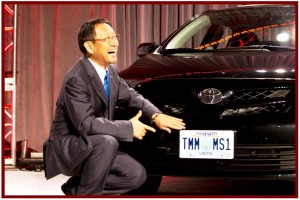
Akio Toyoda, president of Toyota Motor Corporation, displays the State of Mississippi's new license plate on the first U.S. built Corolla on 17 Nov 2011. More U.S. production will be forthcoming.
Toyota Motor Corporation today drastically cut its fiscal year 2012 forecast based on the ongoing negative effects of the strong Yen and the production disruptions caused by the Thailand floods. As a result, Toyota has revised down its 2012 full year profit forecast by -¥250 billion to ¥200 billion, a 54% decline.
Toyota had delayed its forecast last month when it reported 2012 Q2 financial results, which were severely damaged by the Japan earthquake and tsunami in March. Toyota now says full production will be restored in all regions by mid December except Thailand, which should be back by year end. (See Toyota Loses ¥33 Billion in First Half FY 2012. Scraps Forecast)
Global Toyota vehicle sales are now expected to be 7.32 million, which means that General Motors Company and/or Volkswagen Group will be larger automakers in the near term. Thailand floods will cost Toyota sales of ~130,000 vehicles – 20,000 better than the last forecast but still a large drop, particularly in Asia where Toyota is the largest automaker.
Previously Toyota had forecast sales of 7.6 million units globally, an increase compared to the previous year at 7.4 million. This is well below Toyota’s global sales peak in 2007 of a record 8.42 million units. Toyota’s worldwide sales declined in 2008 and 2009 as well because of the Global Great Recession.
The effect of the strong Yen is also hurting Toyota results. Toyota now says it will assume a foreign exchange rate of ¥78 per U.S. dollar and ¥109 per Euro, for the full-year average. This is down from ¥86 and ¥113, respectively in last year’s results, when Toyota earned ¥408 billion, or more than twice the current forecast. In the United States, Toyota’s second largest market, each change of ¥1 means a change of ¥32 billion in annual revenues.
“Profitability of exports is very, very difficult,” said Takahiko Ijichi, TMC Senior Managing Officer, on a conference call with analysts, including AutoInformed. Currently Toyota exports 1.73 million vehicles from Japan where it builds 3 million vehicles annually. Exports of vehicles, as well as engines, transmissions and component parts will decrease as more local production is added, the well-spoken Ijichi promised.

